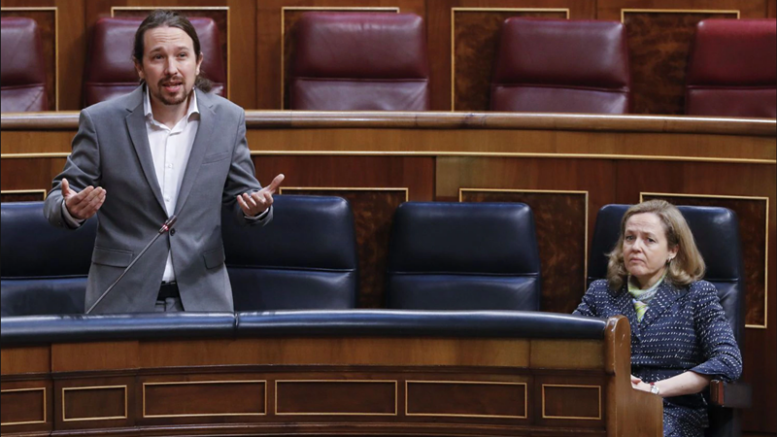The first session of the special “Reconstruction Commission” in Spain’s Congress got off to a bumpy start Thursday, with two opposing viewpoints on how much to tax Spain’s wealthiest individuals and corporations being put forward by two cabinet ministers of the coalition government led by President Pedro Sánchez.
Second Vice-President for Social Affaris Pablo Iglesias put forward his Unidas Podemos party’s position that Spain’s economic recovery from the coronavirus crisis should be funded from a special wealth tax levied against Spain’s wealthiest citizens and corporations.
Third Vice-President and Economy Minister Nadia Calviño put forward the coalition government’s official “investment and reform” plan, which does not include a specific wealth tax but does call for more progressive fiscal policies and the introduction of new taxes across the board.
Calviño, who prior to joining the first Sánchez government in 2018 served four years as the Director-General for Budget of the European Commission, defended the government’s more orthodox approach to taxation, saying that “fiscal responsibility and investor confidence are also keys to recovery.”
► News Sources: El País, 20minutos and El Independiente…
The so-called “wealth tax” being proposed by Unidas Podemos would exempt from taxation a primary residence up to the value of 400,000 euros and net assets of an individual up to 1 million euros. Above that, an individual or family’s net assets would be taxed at the rate of 2 percent up to 10 million euros, 2.5 percent to 50 million euros, 3 percent to 100 million euros and 3.5 percent for any amount greater than 100 million.
Iglesias’ party estimates that as much as 11 billion euros, equivalent to 1 percent of Spain’s GDP, could be raised through the tax, but those figures have been disputed by individual analysts.
During committee appearances and plenary sessions of the Congress and the Senate this week, both Calviño and Finance Minister María Jesús Montero have defended the government’s more orthodox legislative proposals as sufficient to provide the necessary revenues needed to balance the budget.
These include a new tax on digital services, widely referred to as the “Google Tax”, as well as the so-called Tobin tax, named after the U.S. Nobel prize winning economist James Tobin and designed to de-incentive financial speculation through increased taxation. The government has also proposed raising taxes to fund Spain’s transition to a new “green” economy, specifically targeting the manufacture and sale of plastics, as well as air transport, in an effort to help Spain meet its commitments on reducing carbon emissions.
► Click to read more news about the Economy in Spain …
Check out more news from Spain about:
► Animal Welfare ► Corruption/Transparency ► Discrimination ► Economy ► Education ► Elections ► Environment & Sustainability ► Fair Trade & Development Aid ► Healthcare ► Historical Memory ► Housing & Homelessness ► Human Rights ► Labour & Unemployment ► LGBT+ ► Politics ► Poverty ► Refugees & Migration ► Technology & Social Enterprise ► War & Peace ► Women’s Rights

All images at ProgressiveSpain.com are the copyright of their respective authors/owners and are reproduced here for non-commercial, journalistic purposes in accordance with Fair Use doctrine. All other content is Copyright © 2015-2020 ProgressiveSpain.com and is licensed under a Creative Commons Attribution-NonCommercial-ShareAlike 4.0 International License.

